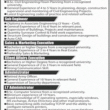While working on number of mega construction projects, I’ve got the opportunity to deal with number of different types of contracts in civil engineering. Civil Engineering companies including contracting companies and consultant firms’ work together to build and construct projects for employers or different clients.
Be it a road or highway project or some mega dam construction projects, you always have to deal with number of contracts. Even if you’re working on a multi-story building that doesn’t have enormous scope of work; still the contract is there.
A contract in construction and civil engineering is an agreement between two or multiple parties that sets the outline of terms and conditions for a particular project. It’s a critical document for any project that not just outlines the responsibility of each party but it’s a legal agreement that helps smooth inception, construction, completion and delivery of the project.
Two of the most common types of contracts in civil engineering are lump-sum and labor contract. But in our today’s I’ve tried to cover many different types for your understanding.

Item Rate Contract or Unit Price Contract
This type of contract is based on the individual items of work included in the project. The contractor is paid a fixed rate for each item of work completed. This type of contract is often used for projects that have well-defined work items and clear specifications, such as building a road or a bridge. It provides a clear understanding of the cost of each work item, making it easier for the client to budget and manage their expenses.
Also Read: What are Star Rates? Re-measurement Contract – Requirements (MUST Know)
Percentage Rate Contract
This type of contract is based on a percentage of the total cost of the project. The contractor is paid a percentage of the total cost for each stage of the project. This type of contract is often used for projects that have a high degree of uncertainty or for projects that require a high level of flexibility. It provides a more flexible payment arrangement and is particularly useful for projects that require a lot of design work.
Also Read: Contract Documents consists of
Lump-Sum Contract
A lump-sum contract is a fixed-price agreement between the client and the contractor. The contractor is paid a fixed amount for the completion of the entire project, regardless of the actual cost. This type of contract is often used for projects with well-defined specifications and a clear scope of work. It provides a clear understanding of the total cost of the project, making it easier for the client to budget and manage their expenses.
Like Us on Facebook!
All-in Contract
An all-in contract is a type of contract where the contractor is responsible for all aspects of the project, including materials, labour, and equipment. The client pays a fixed fee for the entire project, regardless of the actual cost. This type of contract is often used for projects that require a high level of control and management, such as large-scale infrastructure projects. It provides a single point of responsibility for the project, making it easier for the client to manage the project and reduces the risk of disputes.
Subscribe Us on YouTube!
Labour Contract
A labour contract is a type of contract where the client provides all materials, equipment, and machinery, and the contractor is responsible for providing labour. The client pays the contractor for the labour services provided. This type of contract is often used for projects that require a high level of skilled labour, such as the construction of a building. It provides a clear understanding of the cost of labour and makes it easier for the client to manage their expenses.
Also Read: Contract Documents Definition, parts, sample
Cost plus contract
Cost plus contracts are another type of engineering contract used in construction and civil engineering projects. In this type of contract, the contractor is paid a fixed fee based on the total cost of the project, plus an additional fee for the profit margin. This fee can be a percentage of the total cost or a flat rate. The advantage of this type of contract is that the contractor is incentivized to manage the project efficiently and effectively, as their profit depends on the total cost of the project.
In a cost plus contract, the owner agrees to pay the contractor for all the direct costs of the project, including materials, labor, and equipment. In addition, the owner agrees to pay a percentage fee on top of these direct costs. This fee can range from a few percent to as much as 20%. This extra fee compensates the contractor for overhead expenses such as rent, utilities, and office staff.
Cost plus contracts can be used for projects where the final cost of the project is difficult to determine at the start of the project. This could be due to a number of factors, such as changing regulations, unexpected site conditions, or the use of new technologies. In these situations, a cost plus contract provides the owner with a degree of certainty regarding the final cost of the project, as they only have to pay for actual costs incurred, plus the agreed-upon fee.
Also Read: 8+ Terms Contract Managers must know
Materials supply Contract
Materials Supply Contract is another type of engineering contract that is commonly used in the construction industry. In this type of contract, a contractor is responsible for the procurement and supply of materials required for the construction project. The contract agreement specifies the type and quality of materials that the contractor must supply, along with the delivery schedule and payment terms. The contractor is usually responsible for the cost of the materials, including any transportation costs, taxes, and duties.
The advantage of a Materials Supply Contract is that it can reduce the burden on the client, as the contractor takes on the responsibility of procuring the materials required for the project. This type of contract also provides more certainty to the client as they are not required to worry about the delivery and quality of materials, as these are the responsibility of the contractor.
However, there is a risk of cost overruns as the contractor is responsible for the cost of the materials, and if the prices of the materials increase, the cost of the project may also increase. In order to mitigate this risk, the contract agreement should clearly specify the payment terms and the cost escalation provisions.
Cost Plus Fixed Fee Contract
Cost Plus Fixed Fee Contract is a type of engineering contract that is commonly used in construction and other related fields. In this type of contract, the contractor is reimbursed for all the actual costs incurred for completing the project, plus a fixed fee. This fixed fee is determined at the start of the project and does not change, regardless of the actual cost of the project.
The main advantage of the Cost Plus Fixed Fee Contract is that it provides the contractor with a stable income stream and eliminates the risk of incurring a loss. The contractor is reimbursed for all the costs incurred, including labor, materials, and equipment, and the fixed fee provides a guaranteed profit. This type of contract is often used when the scope of the project is uncertain and the cost of the project cannot be accurately determined in advance.
The owner of the project benefits from this type of contract because they have a clear understanding of the costs involved and can budget accordingly. In addition, the fixed fee provides an incentive for the contractor to keep the costs under control and to work efficiently.
One of the challenges of the Cost Plus Fixed Fee Contract is that it can lead to cost overruns if the contractor is not careful. The contractor may be incentivized to overspend on materials and labor in order to increase their profit. To avoid this, it is important for the owner to carefully monitor the contractor’s expenses and to have a system in place for verifying the actual costs incurred.
Also Read: Construction Contracts
Cost Plus Sliding Or Fluctuating Fee-Scale Contract
A Cost Plus Sliding or Fluctuating Fee-Scale Contract is a type of construction contract where the contractor is paid for the actual cost of the work plus an agreed-upon fee that may either be a fixed percentage of the total cost (sliding fee scale) or may fluctuate based on specific conditions or factors (fluctuating fee scale). This type of contract is often used in construction projects where the scope of work or the cost of materials is uncertain and may change throughout the project. The sliding or fluctuating fee is used to compensate the contractor for assuming the risk of changes in cost.
Under this type of contract, the contractor provides regular updates on the actual costs of the project, including materials and labor, and the fee is adjusted accordingly. The goal of the cost plus sliding or fluctuating fee-scale contract is to ensure that the contractor is fairly compensated for their work while also providing cost certainty for the owner.
It is important to note that this type of contract can be complex and requires close monitoring and frequent communication between the contractor and owner to ensure that the actual costs of the project are accurately reflected in the final fee. Additionally, there may be legal or regulatory restrictions on the use of cost plus contracts, so it is important to seek the advice of a qualified attorney before entering into such an agreement.
Build Operate Transfer BOT Contract
BOT (Build-Operate-Transfer) is a type of public-private partnership (PPP) model that involves a private company financing, constructing, and operating a public infrastructure project, and then transferring ownership of the project to the government after a specified period of time.
Under a BOT contract, the private company takes on the financial and technical risks of building and operating the project, while the government provides the necessary approvals, permits, and support to complete the project. After a specified period, the private company transfers ownership of the project to the government, usually after recouping its investment and earning a profit.
BOT contracts are commonly used in infrastructure projects such as highways, airports, ports, power plants, and water treatment facilities. The key benefits of the BOT model are that it can help to attract private investment for public infrastructure projects and transfer some of the risk from the government to the private sector.
However, BOT contracts can also be complex and require close negotiation between the government and private company to ensure that the terms of the contract are mutually beneficial. There may also be concerns about the transfer of ownership from the government to a private company, as well as potential conflicts of interest if the private company is also responsible for operating the project.
Turn Key Contract
A turnkey contract is a type of construction contract where a single entity (the turnkey contractor) is responsible for the design, construction, and commissioning of a project, and “hands over the key” to the client when it is completed and ready for use. In other words, the client is only required to turn the key and start using the facilities, without having to worry about any additional work that needs to be done.
Under a turnkey contract, the turnkey contractor is responsible for all aspects of the project, from planning and design to construction, procurement of materials, and commissioning. The client provides the land, if necessary, and agrees to pay the turnkey contractor a fixed price for the completed project. The turnkey contractor assumes the risk of any cost overruns or delays, and is responsible for ensuring that the project is completed on time, within budget, and to the specified quality standards.
Turnkey contracts can be beneficial for clients who have limited in-house resources and expertise, or who want to minimize their involvement in the project and transfer the risk to the turnkey contractor. However, the client must have a high level of trust in the turnkey contractor and must be confident in their ability to deliver the project as specified.
Summary
| Contract Type | Advantages | Disadvantages | Risk Factors |
| Item Rate Contract | Clear understanding of the cost of each work item | Can be more expensive if the cost of a work item increases | Cost overruns if the cost of a work item increases |
| Percentage Rate Contract | More flexible payment arrangement | Final cost of the project is uncertain | Risk of cost overruns if the final cost of the project is higher than expected |
| Lump-Sum Contract | Clear understanding of the total cost of the project | No room for changes or additions to the project | Risk of cost overruns if additional work is required |
| All-in Contract | Single point of responsibility for the project | Lack of control over the cost of the project | Risk of cost overruns if the actual cost of the project is higher than expected |
| Labour Contract | Clear understanding of the cost of labour | The client is responsible for providing all materials, equipment, and machinery | Risk of cost overruns if the cost of labour increases |
| Cost Plus Contract | Contractor is incentivized to manage the project efficiently and effectively | Final cost of the project is uncertain | Risk of cost overruns if the actual cost of the project is higher than expected |
| Materials Supply Contract | Reduces the burden on the client | Contractor is responsible for the cost of the materials | Risk of cost overruns if the prices of the materials increase |
| Cost Plus Fixed Fee Contract | Contractor has a stable income stream and eliminates the risk of incurring a loss | Final cost of the project is uncertain | Risk of cost overruns if the actual cost of the project is higher than expected |
| Cost Plus Sliding Or Fluctuating Fee-Scale Contract | Fair compensation for the contractor for the actual cost of the work and the risk of changes in cost Cost certainty for the owner Flexibility to adjust the fee based on changes in cost throughout the project | Complex and requires close monitoring and frequent communication between the contractor and owner May be restricted by legal or regulatory restrictions on the use of cost plus contracts | Inaccuracies in the actual cost of the project can result in an unfair fee for the contractor or additional costs for the owner Potential disputes between the contractor and owner over the actual cost of the project or the fee |
| Build Operate Transfer BOT Contract | Attracts private investment for public infrastructure projects Transfers some of the risk from the government to the private sector Can provide a more efficient and cost-effective solution for public infrastructure projects | Complex and requires close negotiation between the government and private company Potential transfer of ownership from the government to a private company Potential conflicts of interest if the private company is also responsible for operating the project | Inadequate risk assessment and negotiation can result in unfavorable terms for the government or private company Failure of the private company to complete the project on time, within budget, and to the specified quality standards Potential disputes between the government and private company over the terms of the contract or the operation of the project |
| Turn Key Contract | Minimizes client involvement in the project and transfers the risk to the turnkey contractor Simplifies the project process for the client by having a single entity responsible for all aspects of the project Provides a fixed price for the completed project, which can provide cost certainty for the client | High level of trust required in the turnkey contractor and their ability to deliver the project as specified The client has limited control over the project and must rely on the turnkey contractor to deliver the project as specified | Cost overruns or delays can result in additional costs for the client Failure of the turnkey contractor to deliver the project as specified can result in significant financial and operational consequences for the client. |
The Bottom line
Different types of contracts are used in civil engineering for a construction project depends on the specific needs and requirements of the project.
Each type of contract has its own unique features and benefits, and it is important to choose the right contract for the project to ensure the success of the project and to minimize the risk of disputes.
It is also important to have a clear understanding of the terms and conditions of the contract, to ensure that all parties are aware of their responsibilities and obligations.
Further Read: How to choose a type of contract for your construction project?





















